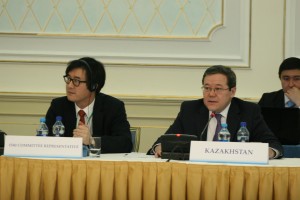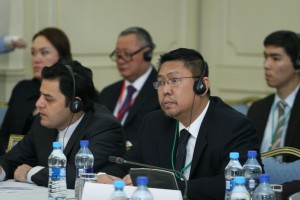 ASTANA – The capital of Kazakhstan hosted a seminar March 11-12 on the contribution of Resolution 1540 (2004) in regional and global disarmament and non-proliferation dedicated to the 10th anniversary of the resolution in the “Central Asia +” format.
ASTANA – The capital of Kazakhstan hosted a seminar March 11-12 on the contribution of Resolution 1540 (2004) in regional and global disarmament and non-proliferation dedicated to the 10th anniversary of the resolution in the “Central Asia +” format.
The Kazakhstan Ministry of Foreign Affairs, the United Nations Office for Disarmament Affairs (UNODA) and the Committee of the UN Security Council 1540 (1540 Committee) organised the event. It brought together representatives of five countries that are permanent members of the UN Security Council, along with ambassadors and representatives from more than 30 other countries, as well as members of international and regional organisations, including the Organisation for Security and Cooperation in Europe (OSCE), Commonwealth of Independent States (CIS), European Union (EU), International Atomic Energy Agency (IAEA), Organisation for the Prohibition of Chemical Weapons (OPCW) and others. The Kazakhstan side at the seminar was represented by Ambassador at Large Barlybay Sadykov.
The seminar, held on the eve of the 10th anniversary of Resolution 1540 and the Nuclear Security Summit in The Hague on March 24-25, provided an opportunity for stakeholders to share experiences on the implementation of Resolution 1540 at the national level, to assess its contribution to regional and global non-proliferation and disarmament, and to make suggestions to strengthen regional and international cooperation in the field of non-proliferation and counter-terrorism.
On April 28, 2004, the United Nations Security Council unanimously adopted Resolution 1540 under Chapter 7 of the UN Charter, which affirms that the proliferation of nuclear, chemical and biological weapons and their means of delivery constitute a threat to international peace and security.
With the adoption of Resolution 1540, a special Committee 1540 was established to inform the UN Security Council on the implementation of the requirements of the resolution by UN member states.
The resolution obliges states, among other things, to refrain from supporting by any means non-state actors from developing, acquiring, manufacturing, possessing, transporting, transferring or using nuclear, chemical or biological weapons and their delivery systems.
Resolution 1540 imposes binding obligations on all states to adopt legislation to prevent the proliferation of nuclear, chemical and biological weapons and their means of delivery, and establish appropriate domestic controls over related materials to prevent their illicit trafficking. It also encourages enhanced international cooperation on such efforts.
The resolution also affirms support for multilateral treaties that seek to eliminate or prevent the proliferation of weapons of mass destruction (WMD) and the importance for all states to implement them fully. It reiterates that none of the obligations in Resolution 1540 shall conflict with or alter the rights and obligations of States Parties to the Treaty on the Non-Proliferation of Nuclear Weapons, the Chemical Weapons Convention, or the Biological Weapons Convention or alter the responsibilities of the IAEA and OPCW.
Kazakhstan has consistently pursued non-proliferation of WMD and adopted measures to implement provisions of Resolution 1540.
In 2011, Kazakhstan held a similar seminar to strengthen cooperation and implementation of the resolution at the regional level.
According to the country’s foreign ministry, Kazakhstan is a candidate for non-permanent membership on the UN Security Council in 2017-2018 and, if elected, intends to promote non-proliferation and nuclear security within this UN body.

